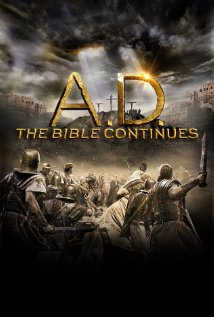My brief review of A.D. The Bible Continues “The Spirit Arrives,” as shown on NBC on Sunday, April 19th, 2015.
It was exciting to find out a TV narrative on the mystical event of Pentecost was going to be produced by an established filmmaker, but when broadcast, it did not supply any answers to this age-old debate.
When NBC announced that they were going to do one broadcast in the A.D. The Bible Continues series on Pentecost, I was very intrigued. How were they going to cover this difficult text in the Book of Acts? Would it be a miracle of speaking or hearing? Was it going to be ecstatic utterances or languages? Did the Apostles possess this gift for the rest of their lives or was it just temporary? What was the purpose of it?
As many are well aware, this website is the source for the Gift of Tongues Project which is a repository of all things related to the Christian doctrine of tongues — from the earliest original Greek texts all the way to the Azusa Street Revival in the twentieth century. It has been a long process to accumulate all this data and see first-hand how the story of Christian tongues has evolved throughout the centuries.
It was eagerly anticipated how the writers, directors, and actors were going to figure out this first-century event that has been interpreted and reinterpreted for almost two millenniums with no known conclusion. I knew it wasn’t going to be easy, but I had seen scriptwriters do amazing things before, and thought this might be another opportunity for them to shine.
The show went on and on. It kept me in suspense on when the mystical Pentecost event was going to happen. Sub-plot after sub-plot it finally occurred. I blinked, and the Pentecost scene was over.
This short moment about Pentecost which made the apostles look like some esoteric freaks on a language trip. It appeared that the producers didn’t know how to fit Pentecost into the narrative and inserted this brief piece only because they had to. They preferred to focus on the cruelness of Pontius Pilate and some weird thing going on with his wife.
Pentecost lost its entire meaning in this film because it refused to include the richness of the Jewish culture or symbolism of the time. The show was focused on a later version of the gentile faith, and not the present people, who happened to be almost all Jews, who felt that their Jewish identity was strengthened through the death and resurrection of Christ.
The clothing and the actors’ physical appearance themselves were devoid of Jewish symbolism – though at least one historian on Twitter conjectured that the actors looked a lot like the paintings found in some first BC to third AD Egyptian tombs. It is a great comparative, even though it is likely accidental. Fayum tombs probably were not in the minds of the writers or the producers of the show, but the images are similar. The actors appeared to be representative of modern Western ideals more than the Jewish antecedents that caused all this. However, I must be less critical in the theatrical presentation. This show was made to appeal to a western audience.
Pentecost is the Greek equivalent of the Hebrew holiday, Shavuot. Shevuot was the celebration of God’s giving the Law to Moses, which God was thought to have spoken in all the languages of the world to Moses when He gave it. The Apostles speaking in tongues was the giving of the new Law, and therefore God spoke again in the languages of all the nations. It was a sign that the good news of Christ was not only for the Jews but the whole world. This purpose was not apparent in this show. I am not so sure if the actors here spoke in foreign languages, though it seemed a line here or there was in Latin or other languages. They did not speak in any length to say that it was a miracle. Other clips showed as if some were in a state of ecstatic speech, or a combination of both ecstasy and foreign languages. It did show the experience to be of personal benefit, but nothing impacting on the society around them, which the writer of the Book of Acts, Luke, clearly explained to be a miracle validated by public bystanders. Some of whom thought they were merely drunk.
So, this portrayal fell very short of my expectations. Here was an opportunity to either set the record straight or forward a controversial explanation. Either would have been fine if they caused further dialogue in the Christian community that worked towards a positive account. Unfortunately, their re-enactment was so brief and puzzling that it leaves everything that happened at Pentecost very ambiguous. It doesn’t allow for much debate, as it was just a personal thing among 11 or so people in a room and nothing more.
